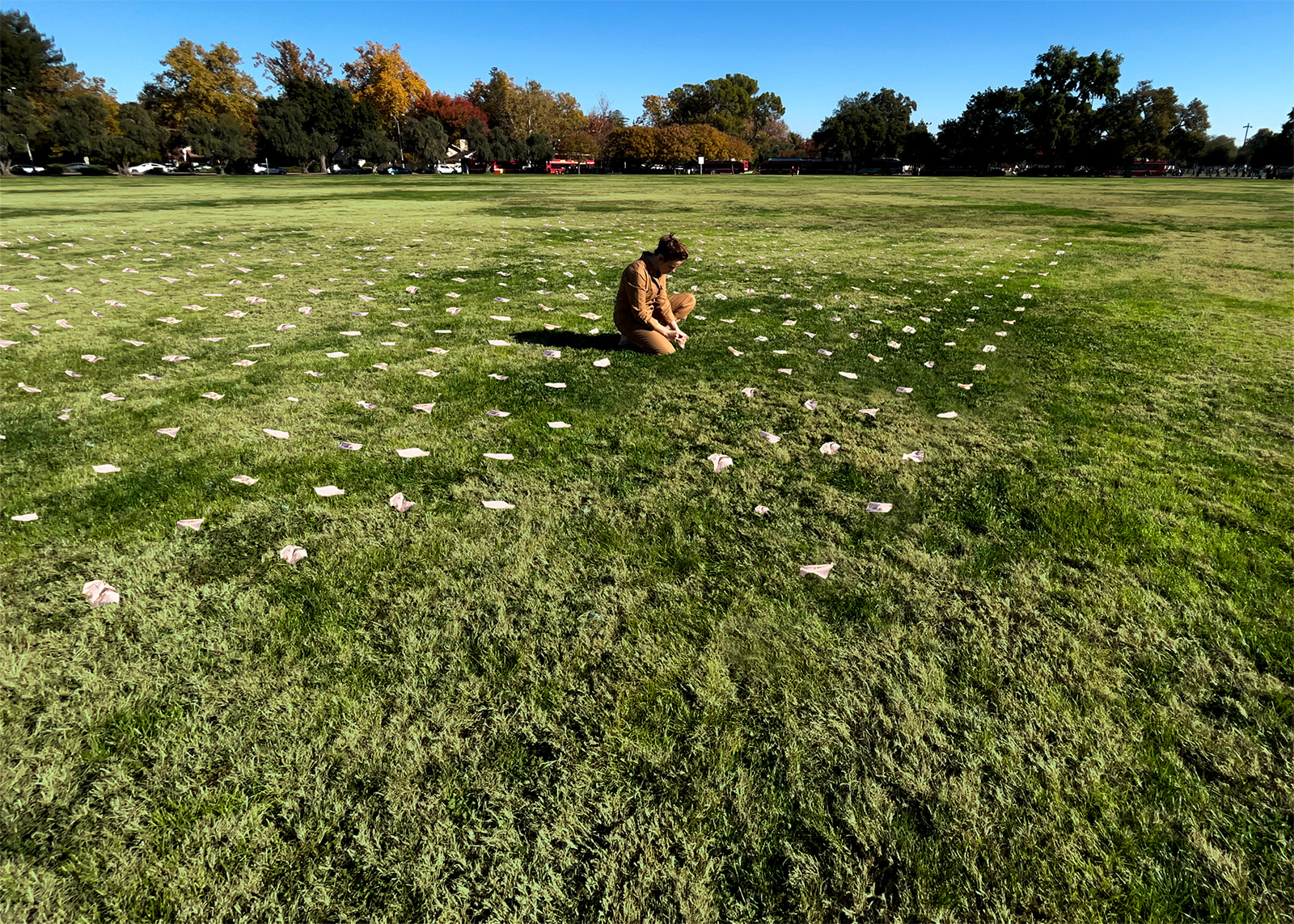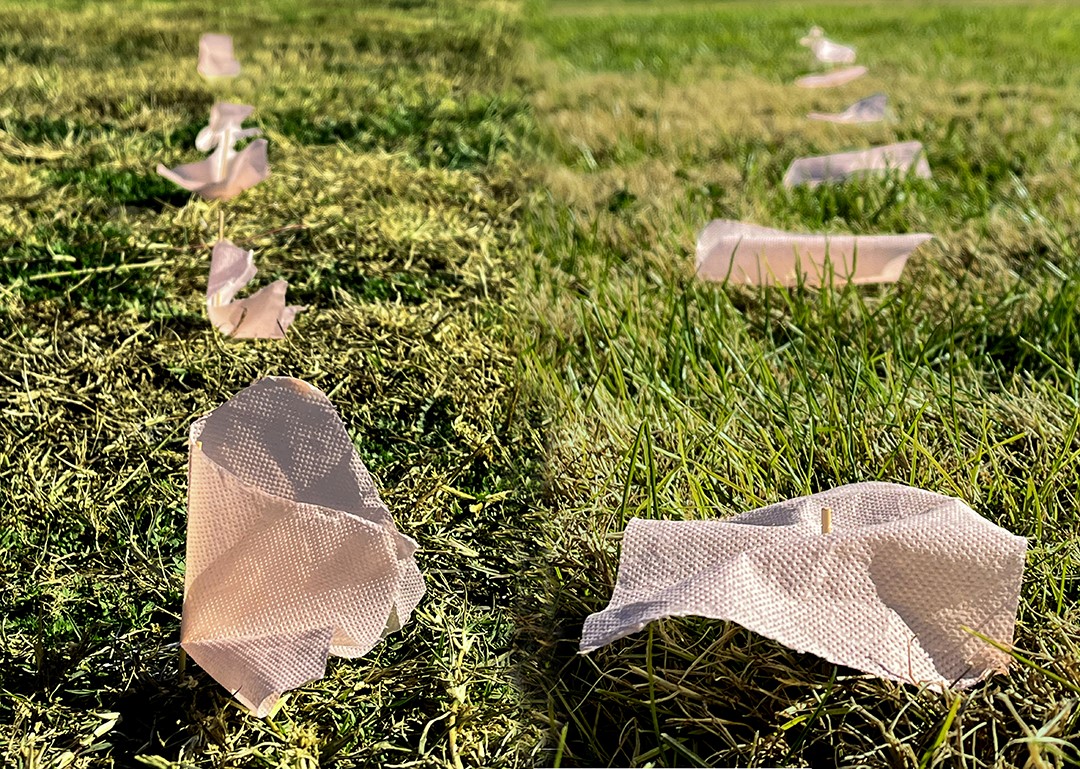
peach grove
em irvin
i plant a grove of peaches in a field. the peaches are toilet paper, marketed to smell and look like peaches. they quilt the earth planted in a grid, like tiles, giving space to each square for the potential to grow just as peaches are planted in hopes that their seeds will grow. however, the toilet paper peaches will never grow. they will never nourish me. they will only decay as paper does and poison the soil with their perfume.

to prepare the squares for planting, i tear each one from its roll and de-ply it, gently peeling the top layer from the middle and bottom. the top layer holds its peachyness, dyed and fragrant. the tops are saved while the other layers are set aside as waste. one of the squares has undergone a production error and is missing its embossed peachy pattern. it is a peachless peach. i should dispose of it.
with my peaches, i crawl slowly across the field, inching my way through the grass, piercing each one with a toothpick and planting it in its place. i am exhausted by this labored position. repetition becomes excruciating. i fall backwards and hallucinate the sky as my pain is transposed into vision. stillness attunes me to the aching parts of myself. i fractured my lower back as a child, and i start to feel the cracks resurfacing along with the memories they bring. i have taken for granted the amount of energy that my body needs to perform. i am hungry and my muscles are full of tar, sticking together between movements.

the labor of planting peaches is productively unproductive as this work will never grow and fails to sustain me. my intention to satisfy hunger, to grow peaches, is carried out through my repetitive intensity of bending over gain in vain and perpetuates my own hunger. to satisfy hunger is a caring task. but when care is given here, it is neglected there. care and neglect write the conditions for this choreography of hunger.
as i work, nearby, there is a picket line of student workers on strike, imagining possibilities for the growth of their work. i am supposed to be there, but i am not. i am here, crossing the picket line, planting peachless peaches. i hear their drumming and chanting. their rhythm is my rhythm as i continue through the grass. some of the students have blocked the road with banners, loud music, and their bodies as a barricade. a car tries to turn into their street, but they do not let it, using their paper sign to block the way. the driver exits the vehicle with a baseball bat.
a drone captures the grove, documenting my synthetic effort to grow peaches. i hear its humming come and go. i match its pitch with my own humming. as the drone captures the grove, it also surveils the picketing, the resistance of the students to work under certain conditions. some of the students are worried that the drones are there for them. i should explain to them that it is only here for the peaches this time.
this grid operates as the backbone of productivity in industrialized agriculture, leveraging forced mechanization of bodies—of people, plants, the earth, and those held by it—to plant and sow in gridded patterns prioritizing profit and maximizing efficiency. the grid orients me to my most productive self in this peachy performance. it is a reality built from and maintained by cycles of exploitative and (un)documented labor. it is a system that derives profit from the exhaustion of the land and her kin, from a monoculture that devours intimacies and ecologies of people and peaches, soil and worms. the lives of organisms that have come before, held in the life giving potential of the ground is stripped and taken to plastic grocery networks whose locations are not accessible to those manipulated by this system to bring forth peaches.
like the agricultural system that takes and takes and takes and takes and takes, the paper peaches are marked by their appearance and marketability. it is wasteful as i separate out disposable peach squares, like the industrial farming practices in search of the perfect seed, the perfect peach, the peach that is perhaps not the most tasteful, sweet and delicious as it evidences an earth that has been cared for, but aesthetically the peachiest peach with tough skin that does not bruise easily when thrown into crates. peaches should be reproducibly blemishless.
aesthetic perfection maximizes the capacity of the peach as profit, optimizing (re)production and returns to corporation pockets sewn by nation-states that distribute rights and representation to a select few as collateral for the perpetuation of a bottom line that feeds them. these are the pockets that the picketers protest, the institutions that take from students and agricultural laborers. these are asymmetrical systems. structures of taking are connected, and as they take, they strip this landscape of feeling, care, and connection. this is a landscape hungry. this is the current state of the peach.

i begin to scratch my hands more often. small red clusters of hives begin to rise up. the peachy perfume has leached into my skin. i have embodied the protest of the picketers as my own body now protests the artificiality of the peaches. my allergy to the peaches has an uncanny timeliness to the demands i have made of my body to plant the entire grove without rest. despite my swelling hands and now tightening lungs, struggling to breath, i keep going. i must finish planting this grove.
as the last peach is planted, i collapse and the pressure of the ground receiving my body forces the weight of my effort through my mouth. the parts of myself that felt pain earlier have gone numb. i soak in the coolness of dusk. the drone is taken away. the picketers leave their post. the sun falls. my eyes close and wait for the peaches to grow.